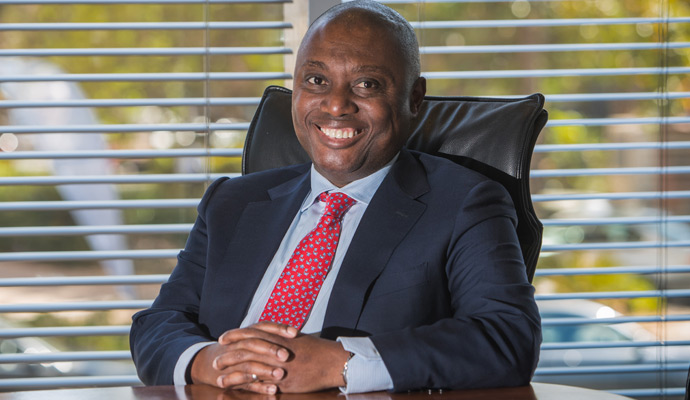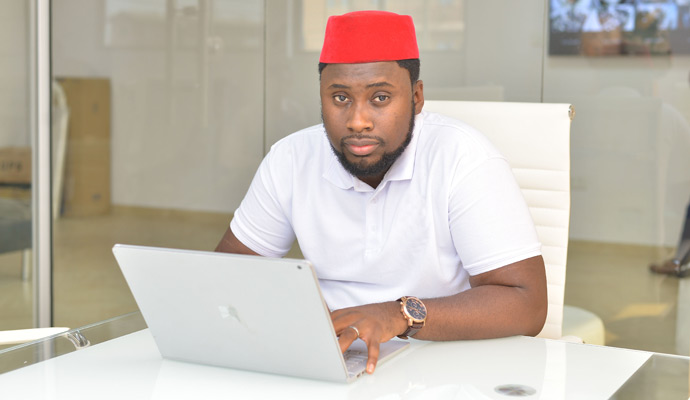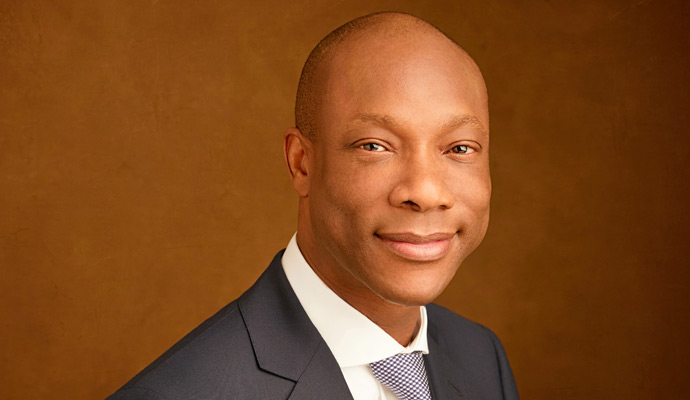Managing Africa’s money
Despite the continent's governance challenges, Standard Bank CEO Sim Tshabalala says Africa is open for business and ready to take advantage of rapid digitization.
This interview is part of the Inside the Mind of the CxO series, which explores a wide range of critical decisions faced by chief executives around the world.
In 1886, when the world’s richest gold reef was discovered on the Witwatersrand, a cliff near what is now Johannesburg, Standard Bank was the first bank to open a branch. Today, it is the largest bank in Africa by assets and only the second bank in South Africa to have a black CEO, Sim Tshabalala. Tshabalala, who was born into apartheid in 1967, grew up on the Witwatersrand in the Soweto Township at one of the most tumultuous moments of his country’s history. He understands the significance of both his bank’s role in the development of his nation and his own role in its rebirth.
Tshabalala credits much of his success to the influences of family and education. His grandfather was a schoolteacher and his father was a small-business owner who saved money to ensure his son could attend a rigorous Catholic school outside the township, where he was one of just a few black students. Tshabalala names Thomas Aquinas as his favorite philosopher, and religious values still inspire his approach to leadership and business.
Banking was not his first choice. Tshabalala studied law and philosophy, and his first job was at a law firm. But after completing his master’s degree in public international law at Notre Dame University, he joined Real Africa Durolink, a boutique finance firm, where he eventually ran structured finance. In 2002, he moved to Standard Bank and spent the next decade working across roles and divisions. In 2013, he was appointed joint CEO alongside Ben Kruger. When Kruger stepped down in 2017, Tshabalala became sole CEO and the first black CEO of the group.
It was Tshabalala who championed all things digital at the bank. He emphasized partnerships to create new revenue channels and access alternative data sets. His motto was “In God we trust; everybody else bring data.” The bank’s last results showed that 1.6 billion transactions came from digital channels, compared with just 30 million in-person transactions. Standard Bank’s subsidiary Stanbic recently bagged digital excellence awards in Uganda and Nigeria.
Despite a slew of political, economic, and business challenges, Tshabalala is cautiously optimistic about South Africa and galvanized by the prospects of the larger African continent, which accounts for a third of the bank’s revenues. Even as the South African economy contracted, the bank posted earnings growth of 5 percent, while return on equity increased to 16.8 percent in the first six months of 2018. The bank’s position across the region gives it a formidable edge in a continent that houses the second-fastest-growing banking market and the second most profitable of any global region.
Tshabalala sat down with strategy+business in his Johannesburg office to discuss the changing role of banking and Africa’s future prospects.
S+B: Do you see the role of banks changing in the world?
TSHABALALA: There is absolutely no doubt in my mind that the role of the bank is changing. It’s a little bit like the story of Nokia, which is an important analogy for us. We are at the center of economies today, but our fate could change fundamentally because, in my view, the fintechs and big technology companies are eating into profit streams, not only in payments, but increasingly also in the traditional credit parts of the financial sector. Big tech companies like Amazon, Alibaba, and Tencent do it in a way that delights customers. They have got networks, and lots of capital. They are in a position to become able to stand between a bank and its customers. If that happens, banks could potentially become irrelevant.
S+B: What is your approach to this changing reality in banking?
TSHABALALA: Our approach is twofold. There’s a lot of effort going into building apps, artificial intelligence, robotics, blockchain — all in order to either improve the customer experience or improve the cost of product and service delivery.
On the other hand, we have to be able to offer our customers the ability to meet their life needs either through our own channels or through partnerships. This means that the people who work for us have to change. They have to innovate and become relevant for this brave new world.
S+B: Every year in its CEO Survey, PwC asks CEOs which threats they are most concerned about. What are the threats that have your attention?
TSHABALALA: The first one is cybercrime. We’ve recently experienced two threats — but both have [ultimately] been very good for us. The first event was a fraud perpetrated on our system by a syndicate working in South Africa and Japan. The second event involved our life insurance subsidiary, Liberty, which was subjected to a criminal act. Effectively, the criminals stole data. In both cases, our actions were swift. In the case of Liberty, we were able to limit the data that was stolen, and of course we did not pay the ransom that the criminals were trying to extort.
Both of these events were wake-up calls for us. They helped us improve our security systems and helped us prevent similar attacks in a couple of other countries.
The other big threat is competition from new entrants and big players like Amazon and Google, who’ve got massive networks and capital.
S+B: Are there threats in your industry that other CEOs may be underestimating?
TSHABALALA: I believe South African bankers have a good understanding of the threats. Outside South Africa, the one area that worries me is an underappreciation of the risks associated with money laundering and terrorist financing.
This shows up in the way correspondent banking has been reduced on the continent because international players are de-risking, saying that they don’t want to transact [business] in those jurisdictions because they don’t trust the systems there. That is a big risk and threat. Because of the perceived low levels of compliance, international players don’t want to have correspondent relationships. The consequence of that is that it has the effect of excluding large chunks of Africa from the financial system.
S+B: You’ve talked publicly about the importance of big data. For forecasting, what data are you personally using that your predecessors did not have access to?
TSHABALALA: If I have to name just one simple thing, it’s the tools. Hadoop, for example, is an open source technology designed to process and analyze big data. Now we can predict when, for instance, somebody’s going to get married, or when somebody’s about to go to university, and offer them contextually appropriate solutions in a way that we couldn’t 10 years ago. My predecessors would have made a lot of decisions based on their experience and intuition. Experience and intuition are still very important, but you have got to triangulate them with data. As I always say: “In God we trust; everybody else bring data.”
S+B: How do you view AI’s immediate impact on your business as well as its long-term impact?
TSHABALALA: In the short term, we are beginning to use robots to replace portions of jobs, especially for work that is repetitive and doesn’t require much thought or empathy. We are using AI quite extensively in our group. For example, our reporting on foreign exchange to the authorities is now being done by robots, because it’s repetitive and routine. I am of the school that believes the winners are going to be those that are able to find synergies between machines and people, and compete on the basis of the machines working in a sophisticated way with humans, with people providing the imagination and the empathy.
S+B: You often use the word empathy. It is said that technology is only as good as its designer. In that context, do you think there is a need for philosophy and ethics to play a greater role in design?
TSHABALALA: Absolutely. Because algorithms produce outcomes that are based on the assumptions that you make, if you make sexist or racist assumptions, you will get sexist and racist outcomes. And with sophisticated algorithms, you will get them in large numbers and on steroids. It is imperative to hire people who think about the morality of decisions and the implications of decisions, so you don’t have inappropriate assumptions going into models.
S+B: South Africa is facing significant challenges, politically and economically. What is your approach to steering the company through these volatile times?
TSHABALALA: I have to redouble my efforts to provide leadership at Standard Bank. I keep reminding people of our purpose, which is “Africa is our home, we drive her growth.” There’s an emotional element to that vision. Driving growth is contributing to GDP growth, but also to the human development index. Standard Bank’s role is to do that.
Then there is perceived country risk. If South Africa is a bad investment proposition, it has an impact on my shareholders. Joblessness, corruption, or inappropriate policies have a negative impact on country risk, but they also have a negative impact on the company that I work for. An important part of my job is to contribute to making South Africa a fairer and less risky place. I do that by participating in organized business, and I speak out on things that prevent us from doing our job, which is to create prosperity.
S+B: Globally, African banks are outpacing other banks in terms of growth. What do you attribute this to?
TSHABALALA: The African continent is open for business. There’s financial deepening as a result of individual borrowing, and also due to the development of financial markets. There are countries in Africa like Côte d’Ivoire, Ethiopia, Uganda, and Senegal whose economies are growing at above 6 percent. Banking grows on the basis of GDP growth and banking penetration, and both things are happening in these countries: fast growth and increasing numbers of people getting banking products or other financial products. The big drivers of African growth will continue to be commodity prices, but importantly, the fastest-growing countries that I was referring to don’t have large-scale oil or other mineral resources. They’ve been growing as a consequence of good policies that are making it easy to do business there.
The two big things happening on the continent are the improvement of hard infrastructure, which requires financial activity, and the improvement of soft infrastructure, like health and education. This leads to greater disposable income that translates to growth for retail businesses such as ours. I see those as the vectors of growth for both the corporate and the retail sectors.
S+B: Which of these economies are you most excited about?
TSHABALALA: Mozambique is extraordinary because of the opportunities that arise from [recent] gas discoveries there and the leverage that those will create. Nigeria is an exciting country due to its demographics. Ethiopia is also very interesting, and although the legislation does not allow foreign banks yet, when it does, it will be a great place to do business, because apart from the demographics, Ethiopia has also put in place many policies that promote economic and human development. So as China moves up the production value chain, some of that production moves to a place like Ethiopia.
And then there’s South Africa. There are many people who have negative views about South Africa, but I clearly believe that this is the place to be.
S+B: What advice do you have for businesses that want to enter Africa?
TSHABALALA: To anybody looking at the African continent, I would say yes, Africa has got risks, but if you understand them, you can price them appropriately and generate returns that adequately reward your shareholders. Africans are getting healthier and wealthier, with greater disposable income. Therefore, consumer businesses will do well. Because the economies are deepening, industrial and infrastructure businesses will also do well.
S+B: What are some of the difficult ideological differences facing business in Africa?
TSHABALALA: To begin with, beggar-thy-neighbor policies that could potentially lead to more balkanization. As an example, if you’re in Tanzania, you can’t move information and data outside Tanzania. This kind of balkanization has a negative impact on the movement of goods, people, and capital. In this regard, the introduction of the free trade area is a positive, because it will increase intra-Africa trade and investment.
The other interesting challenge that we face because of who we are at Standard Bank involves China and the United States. My own view is that a multipolar world is a good thing. International trade is a good thing. International competition is a good thing. The fact that you’ve got the Chinese in Africa competing for resources with Europe and the U.S. and competing for trade relations is good for the African consumer and the African producer. The thing is, though, that Africans need to put themselves in a position where they negotiate appropriate deals.
S+B: Your bank is 20 percent owned by a Chinese bank, and China is by far the largest funder of infrastructure projects in Africa. Do you foresee any issues with that situation in the long run?
TSHABALALA: I see a problem if Africans don’t negotiate appropriately, but I see it as a massive opportunity if they recognize that they can have Chinese partners, along with the E.U., the United States, and intra-Africa trade. Then in that context of competition, there’s likely to be more rational conduct and more rational contractual arrangements.
S+B: Are you seeing a lot of value being created by bank and fintech partnerships?
TSHABALALA: Absolutely. Take the case of one of our products, SnapScan. There’s a one-man shoe-polishing business within the bank premises. I use him often and pay him electronically through SnapScan on his phone. He benefits because he doesn’t need cash and he doesn’t run the risk of being robbed. The people who designed this were part of a fintech based in Cape Town. We bought them, and they’re now part of the Standard Bank network. That’s just one example, but there are so many other examples where you partner with fintechs, let them into your system, generate new revenue models, and increase your value propositions for clients.
S+B: How can legacy banks thrive in Africa in a mobile-only banking and commerce culture?
TSHABALALA: There are different approaches. One way would be to start from scratch, either on your own or in partnership with somebody else. The problem with that is that it takes forever to build capability. At Standard Bank, we feel that approach doesn’t work. The second one would be to remain as you are and bet that you can do well as a back office. I don’t think that that will work — you would end up competing only on price. The third option is to digitize yourself, innovate, and learn to partner with the fintechs, big technology companies, and other competitors. That is the approach we follow. It’s risky, but we’re comfortable with that.
We’re not going to be disintermediated. We’re going to partner with others. We accept that the physical channels are going to decline, but electronic channels are going to increase. It’s a bit like owning a mall and letting your competitors be your tenants. We are happy to do that.
S+B: How do you respond to challenger banks that are positioning themselves as the transparent and no-fee alternative to traditional banks?
TSHABALALA: Wait until they go insolvent. It is as simple as that. However, it is true that competition from fintechs and big technology companies will create more transparency. In our case, this has resulted in a reduction in fees and commissions with online transactions. We’re already seeing a shift in which digital channels are on an upward trajectory and physical channels are declining.
S+B: Given the growing base of youth who are potential borrowers, how are you adjusting your decision making?
TSHABALALA: Traditionally, we focused only on transactional behavior or people’s demographics to decide whether to lend to them or not. Now, we combine the traditional approach with partnerships with fintechs, cell phone companies, and big tech to harvest data that is not traditionally used in the credit decision-making process. So these partnerships are important.
S+B: Can you give me an example of how a partnership like this has informed or created a product or service that hadn’t existed before?
TSHABALALA: We have a partnership with MTN Group in East Africa, where we are now providing microloans on the basis of the data generated through the cell phone company. Using the information MTN has on micropayments to predict and offer microloans is valuable.
S+B: You’ve talked about the need for South Africa to be ready for the fourth industrial revolution. Would you talk a little bit more about this?
TSHABALALA: I feel that business, the labor movement, and government have not spent enough time thinking about the implications of competing in the fourth industrial revolution. The consequence of not doing that will mean that we’ll lose the South African national competitive advantage, and the likes of Nairobi in East Africa or Lagos in West Africa will beat us. We need to be working much harder at fixing the soft infrastructure, improving the quality of the schools, increasing the number of research universities so that we can teach people coming through the system the skills that they will need to be competitive in the fourth industrial revolution. The increased use of robots and robotics, if not managed, will make a lot of people redundant.
S+B: What is your perspective on the controversial “land expropriation without compensation” debate that is currently going on in South Africa?
TSHABALALA: As a bank, we are a big player in the agricultural sector, so we’ve got a large exposure. My position is that the reforms will not have a negative impact on property rights. What South Africa does need is a more coherent approach to land reform. So it’s not just expropriation without compensation, but a holistic approach to land reform. We need a coherent policy and set of laws, and I think that that’s what the actual debate is about. We’ve not taken any provisions as a result of the land question. We’re watching closely, and we’re contributing to the policy debate, but we see no reason for anxiety.
S+B: In your role as CEO, what key issues have you had to take a stand on personally?
TSHABALALA: Recently, Standard Bank was obliged under South African law to withdraw banking services from companies linked to the Gupta family, who subsequently came under investigation for corruption. With regard to the same case, we also had to oppose suggestions made by certain officials of the ruling party and certain ministers who were trying to persuade the bank to conduct itself in a manner inconsistent with our values.
We’ve had to take a stand on racism. I wrote a letter to staff on how I think about racism and why it’s important to reject it completely. In that letter I make a reference to my own personal history.
“Experience and intuition are still very important, but you have got to triangulate them with data. As I always say: ‘In God we trust; everybody else bring data.’”
As CEO of Standard Bank, I’m also the global representative for HeForShe, the United Nations women’s solidarity movement for gender equity [Ed. note: PwC is also a partner]. We live in a world that is more than half made up by women, and yet they’re not fairly represented in the most powerful parts of society. I believe that has to change. I want to make my own contribution to that, and Standard Bank is committed to that, and I’ve got the support of my executives and the board to do that.
S+B: You see a significant humanistic component to banking?
TSHABALALA: Banking to me is absolutely a human endeavor. I attribute that perspective to my upbringing. It’s not just about debits and credits. It’s about people buying homes, or fridges for their health, or trucks for their businesses, or building bridges and roads for society.
Today, if you’re a financial institution, you can no longer simply say “I just provide intermediation services.” You’ve got to do it in a sustainable way, which means you have to think about creating jobs. You have to worry about environmental degradation and think very, very hard about anti-money laundering and helping to combat corrupt practices. And in that sense, you are an integral part of society, not just a bank trying to maximize profits.
Author profile:
- Suvarchala Narayanan is a business writer, future of work researcher, and startup consultant. She lives in India and Europe.





